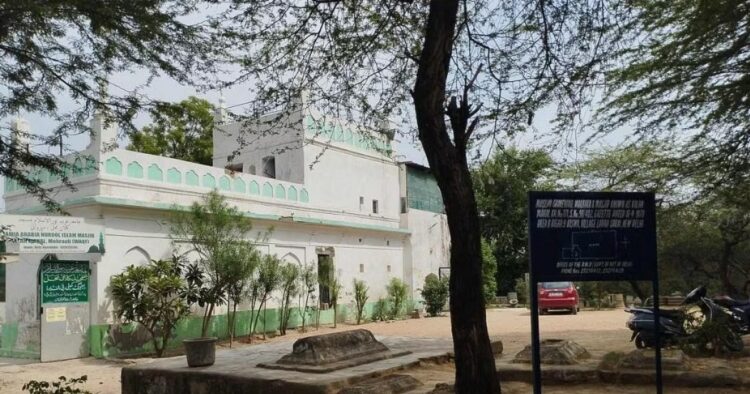- 73,600+ Waqf properties under dispute across India
- New law curbs powers of corrupt Waqf boards
- Scams in multiple states expose political involvement
In a shocking revelation that uncovers deep-rooted corruption and administrative chaos, over 73,600 Waqf properties across India have come under dispute. These disputes stem from encroachments, court litigations, and shady property transfers, according to official data from the Waqf Assets Management System of India (WAMSI), functioning under the Ministry of Minority Affairs.
The Magnitude of the Waqf Property Network
India’s Waqf boards currently own around 8.7 lakh immovable assets spread across 30 states and union territories, making it one of the largest religious property networks in the country. These assets include graveyards, agricultural land, mosques, shops, and houses.
- Graveyards alone make up 17.3%, followed by agricultural lands (16%) and mosques (14%).
- A staggering 58,929 properties are under encroachment, while 13,723 are under litigation, and 994 are marked as alienated due to dubious ownership transfers.
State-Wise Data: A Deeper Look
- Uttar Pradesh leads with 2.4 lakh Waqf properties, though only 3,044 are listed as disputed.
- Punjab has the highest proportion of disputed assets, with 56.5% of its 75,511 properties encroached.
- West Bengal ranks second in disputed properties with 3,742 cases, despite having fewer total assets than UP.
Interestingly, Bihar and UP are the only two states with both Sunni and Shia Waqf Boards.
Waqf (Amendment) Bill: A Historic Overhaul
In a bold and unprecedented move, the Waqf (Amendment) Bill 2025 was passed by the Lok Sabha on April 3 with a 288-232 vote, followed by approval in the Rajya Sabha. After receiving assent from President Droupadi Murmu, the Bill has now become law.
The amendment aims to curtail the unchecked powers granted to Waqf Boards under the Waqf Act, 1995 — an act introduced during Congress rule that allowed extensive autonomy, often misused for corrupt practices.
String of Scandals: A Trail of Corruption and Abuse of Power
Several high-profile cases have come to light recently, reflecting a deeply entrenched rot in the Waqf system. Here are some major examples:
- Karnataka: ₹4 Crore Embezzled by Former Waqf Board CEO
Zulfiqarulla, former CEO of the Karnataka Waqf Board, was booked for criminal breach of trust and cheating.
He allegedly misappropriated ₹4 crore received from the government for dargah land acquisition and diverted the money through 54 transactions.
- Madhya Pradesh: Congress Leader Riyaz Khan Amasses Crores
Former MP Waqf Board head Riyaz Khan, a Congress leader, allegedly siphoned off ₹7 crore by extorting rent from shopkeepers and constructing commercial spaces on Waqf land.
Despite starting out as a tea-seller, he accumulated three bungalows during his tenure.
He is now absconding, with a ₹5000 reward placed on him.
- UP Saharanpur: ₹7.5 Crore Undeclared Income from Waqf Land
In Chilkana, UP, 183 bighas of Waqf land allegedly generated over ₹50 lakh annually for 15 years, totaling around ₹7.5 crore.
The income remained undeclared, pointing to massive tax evasion and financial fraud.
- UP Kanpur: ₹20 Crore Land Sold Illegally
Shadab Khan, former Mutawalli, sold 5000 sqm of Waqf land in Kanpur through forged documents and bogus exchange proposals.
An FIR has been lodged and SIT is probing the matter.
- UP Amroha: 16 Shops Built and Sold Illegally
Anwar Sibtain, Mutawalli of UP Shia Waqf Board, constructed and sold shops without approval.
Investigations found forged documents were submitted to justify the illegal activity.
- Delhi: AAP MLA Amanatullah Khan in ₹100 Crore Waqf Scam
ED arrested Amanatullah Khan, Delhi Waqf Board Chairman, for money laundering and mismanagement.
He allegedly demanded bribes, accepted lower bids for shops, and laundered ₹36 crore through agents.
Additionally, Khan is accused of siphoning money collected for Delhi Riot victims and purchasing property in his second wife’s name.
The newly passed Waqf (Amendment) Act is not just a legal reform – it is a correction to decades of mismanagement, corruption, and religious land misuse carried out under the garb of minority welfare.
Despite opposition from so-called secular parties crying foul, the truth lies in the staggering scale of financial irregularities, illegal land sales, and political shielding of corrupt board members.
With over 73,000 disputed Waqf properties, and counting, it’s clear that the reform wasn’t just necessary – it was urgent. The central government has now taken the first step, but what remains to be seen is how strictly the new rules are enforced – and how swiftly justice is delivered in these scams.

















Comments